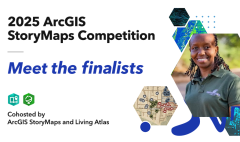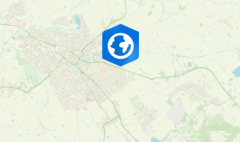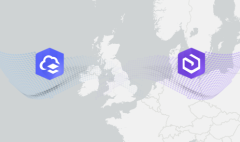Intern Spotlight: Amutuheire Shine on Using GIS for Sustainable Urban Development
October 7, 2025 2025-10-07 14:03Intern Spotlight: Amutuheire Shine on Using GIS for Sustainable Urban Development
Intern Spotlight: Amutuheire Shine on Using GIS for Sustainable Urban Development
As the geospatial industry continues to shape the way we plan, build, and sustain our cities, young innovators are stepping up to make a difference. One such changemaker is Amutuheire Shine, a soon-to-be graduate of Makerere University with a degree in Urban and Regional Planning. Passionate about sustainable urban development and the transformative power of GIS, Shine joined Esri Eastern Africa as an intern to deepen her expertise and contribute to real-world projects that drive meaningful impact.
In this insightful conversation with Rachael Mutuli, Shine reflects on her journey—from discovering Esri’s role in urban planning during her time at Kampala Capital City Authority, to hands-on experiences that strengthened her technical and professional skills. She shares how her internship shaped her career vision, the challenges she overcame, and what keeps her motivated to use geospatial technology for sustainable change.
RM: Can you introduce yourself and tell us a little about your academic background?
AS: My name is Amutuheire Shine, awaiting graduation at Makerere University in a Bachelor of Urban and Regional Planning (2022–2025),. I have strong knowledge and practical skills in urban planning, spatial data management, and GIS, with hands-on experience in ArcGIS, AutoCAD, and SW Maps. These skills enable me to analyze spatial data and support sustainable urban development. I completed my Uganda Advanced Certificate of Education (2019–2021) and Uganda Certificate of Education (2015–2018) at Bweranyangi Girls’ Secondary School, and my Primary Leaving Examinations (2008–2014) at Rukungiri Modern Primary School. My academic background has
equipped me with technical expertise and a passion for using GIS and planning principles to create sustainable, inclusive urban environments.
RM: What inspired you to apply for an internship at Esri Eastern Africa?
AS: My inspiration to apply for an internship at Esri Eastern Africa comes from my strong interest in Geographic Information Systems (GIS) and their role in advancing urban planning and sustainable development. While studying Urban and Regional Planning at Makerere University, I gained a deep appreciation for how Esri technologies, especially ArcGIS, support data-driven decision making and innovative spatial solutions. Esri Eastern Africa’s leadership in promoting geospatial technology and its commitment to empowering communities and professionals align with my career goals. This internship offers an ideal opportunity to enhance my technical skills and contribute to impactful, sustainable planning initiatives.
RM: How did you first hear about Esri Eastern Africa and what stood out to you about the company?
AS: I first learned about Esri Eastern Africa during my internship at Kampala Capital City Authority (KCCA), where I used ArcGIS in spatial data analysis and urban planning. This experience made me appreciate Esri’s key role in supporting effective decision-making through geospatial solutions. I also learned more from a friend who is a GIS expert, who spoke highly of Esri’s innovation and impact. What stood out to me is the company’s commitment to empowering professionals through technology, training, and mentorship, which aligns with my passion for applying GIS in sustainable urban development.
RM: What were your expectations coming into this internship? Have they been met or changed over time?
AS: Coming into this internship, I expected to build on the GIS and planning knowledge I gained from
Makerere University and my experience at KCCA, by applying it to real-world projects. These
expectations have been fully met, as the internship has deepened my technical skills, exposed me
to advanced Esri tools, and strengthened my passion for using GIS to support sustainable urban
development.
RM: Walk us through a typical day in your role during the internship.
AS: A typical day during my internship would involve reviewing the provided study materials to build my knowledge, applying what I’ve learned to my project work, and consulting my supervisors for guidance. This balance of self-learning, practical application, and mentorship helps me progress effectively and contribute meaningfully to the project.
RM: Which projects or tasks did you find most rewarding or impactful, and why?
AS: The most rewarding project during my internship was working on a spatial analysis and mapping task that supported decision-making for urban planning. This project was impactful because it allowed me to apply GIS skills to real-world challenges, transforming raw data into clear visual insights. Seeing how my work contributed to informed planning decisions was both motivating and affirming, as it demonstrated the practical value of my skills in creating sustainable and well structured urban environments.
RM: What new technical or soft skills have you developed during your internship?
AS: During my internship, I developed technical skills in advanced GIS analysis, spatial data management, map visualization using ArcGIS and AutoCAD, and coding for geospatial data processing. I also enhanced my soft skills, including problem-solving, effective communication, and teamwork, by collaborating with supervisors and peers to tackle real-world planning challenges.
RM: Who or what had the biggest influence on your experience at Esri EA?
AS: The biggest influence on my experience at Esri Eastern Africa was my supervisor, Edwin Kiyimba, whose guidance, encouragement, and expertise greatly shaped my learning. I am also deeply grateful to all the Esri EA staff for their support, mentorship, and willingness to share knowledge, which made my internship both inspiring and highly rewarding.
RM: Were there any challenges you faced, and how did you overcome them?
One challenge I faced was not having a personal supervisor with specialized knowledge in my field, as we had a general supervisor. Additionally, communication was sometimes limited, with program details only shared on the day, which reduced preparation time. I overcame these challenges by being proactive—seeking guidance from multiple mentors, researching independently, and adapting quickly to new tasks to ensure I remained productive and engaged.
RM: How has your understanding of GIS evolved in the past three months?
AS: Over the past three months, my understanding of geospatial technology and GIS has deepened significantly. I have gained hands-on experience in spatial data management, advanced GIS analysis, and coding for geospatial processing. I have also developed practical skills using ArcGIS products such as Hub, Dashboards, Story Maps, and Web Maps, which have strengthened my ability to transform data into insightful visualizations that support informed decision-making and sustainable urban planning.
RM: What was your favorite moment or highlight during your internship?
AS: My favorite moment during the internship was successfully completing a project that involved creating an interactive ArcGIS Dashboard and Story Map. Seeing the final product come together and realizing its potential to support decision-making was highly rewarding. It highlighted the practical impact of GIS and reinforced my passion for using geospatial technology to drive sustainable urban development.
RM: How would you describe the company culture at Esri Eastern Africa?
AS: The company culture at Esri Eastern Africa is collaborative, supportive, and innovation-driven. Staff members are approachable and willing to share knowledge, fostering a learning environment. There is a strong emphasis on teamwork, mentorship, and leveraging geospatial technology to create meaningful impact, which makes it both inspiring and motivating to be part of.
RM: How has this internship influenced your career goals or direction?
AS: This internship has strengthened my passion for GIS and urban planning, inspiring me to pursue a career that integrates geospatial technology for sustainable development. It has clarified my goal to specialize in applying GIS tools, such as ArcGIS Hub, Dashboards, and Story Maps, to solve real-world urban challenges and support data-driven decision-making.
RM: What’s one piece of advice you’d give to the next group of Esri EA interns?
AS: My advice to future Esri EA interns is to be proactive in learning and engaging. Make the most of the resources, ask questions, and seek guidance from supervisors and colleagues. Embrace every opportunity to explore ArcGIS tools and take initiative in applying your skills—this will make your internship both rewarding and impactful.
RM: What’s next for you after this internship—academically or professionally?
AS: After this internship, I plan to pursue a master’s degree in GIS to deepen my technical expertise and broaden my knowledge. Professionally, I aim to secure a role that aligns with my career goals, ideally within an NGO or a government entity, where I can apply geospatial technology to support sustainable development and data-driven decision-making.
RM: Would you consider a full-time role at Esri EA in the future? Why or why not?
AS: Yes, I would consider a full-time role at Esri Eastern Africa in the future. The supportive working environment, strong leadership, and culture of innovation make it an ideal place to grow professionally. Combined with the opportunity to work with cutting-edge geospatial technology, it offers a perfect setting to contribute meaningfully to sustainable development projects.
RM: How do you balance your work, learning, and personal growth?
AS: I balance work, learning, and personal growth by setting clear priorities and managing my time
effectively. I dedicate focused hours to work tasks, allocate time to study and explore new skills,
and ensure I reflect on my progress. I also make time for personal development through reading,
networking, and engaging in activities that enhance both my professional skills and overall well
being.
RM: What drives or motivates you, both in your career and in life?
AS: I am driven by a passion for using knowledge and skills to create positive impact, especially through sustainable urban planning and geospatial technology. In my career, I am motivated by solving real-world challenges and contributing to data-driven solutions that improve communities. In life, I am inspired by growth, continuous learning, improving my own life, and making meaningful contributions that leave a lasting difference.
RM: What is one thing you’ve learned about yourself during this internship?
AS: One key thing I’ve learned about myself during this internship is that I am proactive and adaptable. I discovered my ability to quickly learn new tools, navigate challenges, and seek guidance when needed, which has strengthened both my confidence and my commitment to continuous growth in GIS and urban planning.
RM: If you could describe your experience at Esri Eastern Africa in one word or sentence,
what would it be?
Impactful
Interested in joining our next cohort of interns?
If you’re passionate about GIS and eager to make an impact through geospatial technology, we’d love to hear from you. Reach out to us at careers@esriea.com to learn more about internship opportunities at Esri Eastern Africa.





